With the small matter of an England-Scotland match to look forward to at Euro 2020, in preparation for the main event, I thought it would be an opportune moment for a match-up of a different kind – an England-Scotland five-a-side of autobiographies, mixing and matching across history.
England
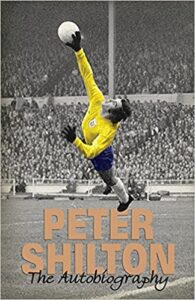 GK: Peter Shilton – The Autobiography/Saved – England’s record appearance maker, Peter Shilton won some 125 caps across a career spanning two decades. He represented England at five major tournaments, including Euro 1980 and 1988 and the 1982, 1986 and 1990 World Cup, and shares the record for most World Cup clean sheets (10) with Fabien Barthez. Peter Shilton’s domestic career took in some 11 teams, including Leicester City, Stoke City and Notts Forest. His forthcoming second autobiography, Saved, to be published in September, will reflect on his struggle with gambling.
GK: Peter Shilton – The Autobiography/Saved – England’s record appearance maker, Peter Shilton won some 125 caps across a career spanning two decades. He represented England at five major tournaments, including Euro 1980 and 1988 and the 1982, 1986 and 1990 World Cup, and shares the record for most World Cup clean sheets (10) with Fabien Barthez. Peter Shilton’s domestic career took in some 11 teams, including Leicester City, Stoke City and Notts Forest. His forthcoming second autobiography, Saved, to be published in September, will reflect on his struggle with gambling.
 Def: Rio Ferdinand – Rio: My Story/Rio: My Decade as a Red/#2Sides – My Autobiography/Thinking Out Loud – With no autobiography by arguably England’s best ever defender, Bobby Moore, Rio Ferdinand steps in as England’s second-most capped central defender (behind Bobby Moore), with some 81 caps and 3 goals. Featuring for England from 1997 through to 2011, Ferdinand was included in three World Cup squads, as well as Euro 2008. Domestically, he won the Premier League, League Cup, Community Shield, Champions League and Club World Cup. His most recent book was published in 2017.
Def: Rio Ferdinand – Rio: My Story/Rio: My Decade as a Red/#2Sides – My Autobiography/Thinking Out Loud – With no autobiography by arguably England’s best ever defender, Bobby Moore, Rio Ferdinand steps in as England’s second-most capped central defender (behind Bobby Moore), with some 81 caps and 3 goals. Featuring for England from 1997 through to 2011, Ferdinand was included in three World Cup squads, as well as Euro 2008. Domestically, he won the Premier League, League Cup, Community Shield, Champions League and Club World Cup. His most recent book was published in 2017.
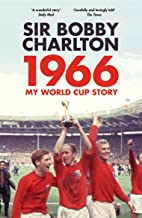 MF: Bobby Charlton – My Manchester United Years/My England Years/My Life in Football/1966: My World Cup Story – One of England’s 1966 heroes, Bobby Charlton won the Ballon d’Or in the same year and was also named FWA Footballer of the Year. He sits seventh on the list of appearances for England, with 106, and second on the list of top goal-scorers, having notched 49 in his career. A noted member of the Busby Babes, Charlton made over 600 appearances for Manchester United and had a career spanning nearly 25 years. Charlton’s clutch of autobiographies cover his impressive career, with the latest charting that epic World Cup triumph.
MF: Bobby Charlton – My Manchester United Years/My England Years/My Life in Football/1966: My World Cup Story – One of England’s 1966 heroes, Bobby Charlton won the Ballon d’Or in the same year and was also named FWA Footballer of the Year. He sits seventh on the list of appearances for England, with 106, and second on the list of top goal-scorers, having notched 49 in his career. A noted member of the Busby Babes, Charlton made over 600 appearances for Manchester United and had a career spanning nearly 25 years. Charlton’s clutch of autobiographies cover his impressive career, with the latest charting that epic World Cup triumph.
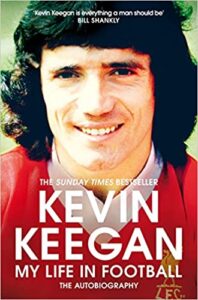 MF: Kevin Keegan – My Autobiography/My Life in Football – The only English footballer to have won the Ballon d’Or twice, Kevin Keegan captained England at Italy 1980. However, with England missing out on both the 1974 and 1978 World Cups, Keegan featured only in Spain 1982, but briefly due to injury. Across his career, Keegan won 63 caps and scored 21 goals, whilst domestic success came most notably at Liverpool. Following management spells with Newcastle and Fulham, Keegan stepped into the England role for one year. His second autobiography was published in 2018.
MF: Kevin Keegan – My Autobiography/My Life in Football – The only English footballer to have won the Ballon d’Or twice, Kevin Keegan captained England at Italy 1980. However, with England missing out on both the 1974 and 1978 World Cups, Keegan featured only in Spain 1982, but briefly due to injury. Across his career, Keegan won 63 caps and scored 21 goals, whilst domestic success came most notably at Liverpool. Following management spells with Newcastle and Fulham, Keegan stepped into the England role for one year. His second autobiography was published in 2018.
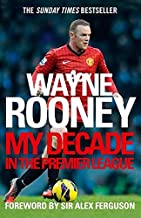 Striker: Wayne Rooney – The Way It Is/My Decade in the Premier League – Wayne Rooney holds the record as both England’s youngest ever goalscorer and the Three Lions’ top scorer, having bagged 53 goals in 120 appearances – whilst sitting second in the most caps chart. His England career spanned some 15 years, including appearances at Euro 2004, 2012 and 2016, and World Cup 2006, 2010 and 2014. Domestically, he holds the record as Manchester United’s top goalscorer, with 253 goals to his name, and is one of only two English players to have won the Premier League, FA Cup, Champions League, League Cup, Europa League and Club World Cup. His second autobiography was published in 2012.
Striker: Wayne Rooney – The Way It Is/My Decade in the Premier League – Wayne Rooney holds the record as both England’s youngest ever goalscorer and the Three Lions’ top scorer, having bagged 53 goals in 120 appearances – whilst sitting second in the most caps chart. His England career spanned some 15 years, including appearances at Euro 2004, 2012 and 2016, and World Cup 2006, 2010 and 2014. Domestically, he holds the record as Manchester United’s top goalscorer, with 253 goals to his name, and is one of only two English players to have won the Premier League, FA Cup, Champions League, League Cup, Europa League and Club World Cup. His second autobiography was published in 2012.
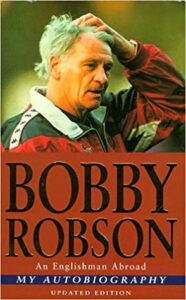 Manager: Bobby Robson – An Autobiography/Bobby Robson: An Englishman Abroad/Farewell but not Goodbye/My Kind of Toon – Whilst it was Alf Ramsey who led England to World Cup success, it was Bobby Robson who oversaw their best post-World Cup campaign, prior to Gareth Southgate’s arrival, leading the Three Lions to the semi-finals of Italia 90. He was at the helm for eight years, winning some 47 of his 95 games in charge, and led England at Mexico 1986 and Euro 1988. As a player, he represented England 20 times, scoring 4 goals, and had a successful managerial career at Ipswich, Barcelona and notably his hometown of Newcastle. As well as a number of autobiographies, Harry De Cosemo’s Black and White Knight was published earlier this year.
Manager: Bobby Robson – An Autobiography/Bobby Robson: An Englishman Abroad/Farewell but not Goodbye/My Kind of Toon – Whilst it was Alf Ramsey who led England to World Cup success, it was Bobby Robson who oversaw their best post-World Cup campaign, prior to Gareth Southgate’s arrival, leading the Three Lions to the semi-finals of Italia 90. He was at the helm for eight years, winning some 47 of his 95 games in charge, and led England at Mexico 1986 and Euro 1988. As a player, he represented England 20 times, scoring 4 goals, and had a successful managerial career at Ipswich, Barcelona and notably his hometown of Newcastle. As well as a number of autobiographies, Harry De Cosemo’s Black and White Knight was published earlier this year.
Scotland
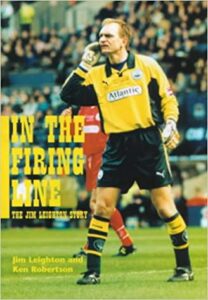 GK: Jim Leighton – In the Firing Line – With 91 caps to his name, Jim Leighton is the most capped Scottish goalkeeper, whilst sitting behind only Kenny Dalglish overall. His Scotland career spanned some 16 years from 1982 to 1998, which included two World Cups in 1986 and 1990. Whilst he missed out on Euro 92 and Euro 96, he returned as number one in the World Cup 1998 qualification and became the oldest player to play for Scotland aged 40 years and 78 days before David Weir surpassed this. His autobiography was published in 2000.
GK: Jim Leighton – In the Firing Line – With 91 caps to his name, Jim Leighton is the most capped Scottish goalkeeper, whilst sitting behind only Kenny Dalglish overall. His Scotland career spanned some 16 years from 1982 to 1998, which included two World Cups in 1986 and 1990. Whilst he missed out on Euro 92 and Euro 96, he returned as number one in the World Cup 1998 qualification and became the oldest player to play for Scotland aged 40 years and 78 days before David Weir surpassed this. His autobiography was published in 2000.
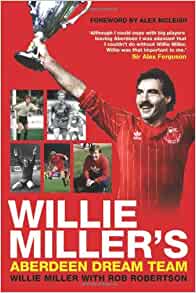 Def: Willie Miller – The Miller’s Tale/The Don/Willie Miller’s Aberdeen Dream Team – Described by Sir Alex Ferguson as ‘the best penalty box defender in the world’, Willie Miller featured for Scotland from 1975 to 1989, amassing 65 caps and one goal. He competed at the 1986 World Cup, but injury meant he missed out in 1990 and ultimately had to retire. Miller’s domestic career was spent entirely at Aberdeen (with a brief loan spell at Peterhead), where he notched up a club record 560 appearances, as well as 21 goals, in a 19-year career. He has three books to his name.
Def: Willie Miller – The Miller’s Tale/The Don/Willie Miller’s Aberdeen Dream Team – Described by Sir Alex Ferguson as ‘the best penalty box defender in the world’, Willie Miller featured for Scotland from 1975 to 1989, amassing 65 caps and one goal. He competed at the 1986 World Cup, but injury meant he missed out in 1990 and ultimately had to retire. Miller’s domestic career was spent entirely at Aberdeen (with a brief loan spell at Peterhead), where he notched up a club record 560 appearances, as well as 21 goals, in a 19-year career. He has three books to his name.
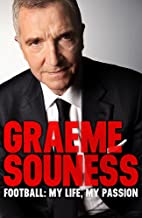 MF: Graeme Souness – No Half Measures/Graeme Souness: A Manager’s Diary/Souness: The Management Years/Graeme Souness – Football: My Life, My Passion – Across 12 years, Graeme Souness made 54 appearances for the Tartan Army, scoring four goals. In his time, he featured at three World Cups, including Argentina 1978, Spain 1982 and Mexico 1986. At club level, he made his name captaining a Liverpool side that dominated in the late 1970s/early 1980s before moving on to Sampdoria and later Rangers. A twenty-year managerial career ended at Newcastle in 2006 before Souness made the move into the media. His most recent autobiography was published in 2017.
MF: Graeme Souness – No Half Measures/Graeme Souness: A Manager’s Diary/Souness: The Management Years/Graeme Souness – Football: My Life, My Passion – Across 12 years, Graeme Souness made 54 appearances for the Tartan Army, scoring four goals. In his time, he featured at three World Cups, including Argentina 1978, Spain 1982 and Mexico 1986. At club level, he made his name captaining a Liverpool side that dominated in the late 1970s/early 1980s before moving on to Sampdoria and later Rangers. A twenty-year managerial career ended at Newcastle in 2006 before Souness made the move into the media. His most recent autobiography was published in 2017.
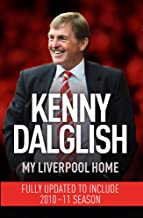 MF: Kenny Dalglish – My Autobiography/My Liverpool Home/Kenny Dalglish: Notes on a Season – As well as a legend of Celtic and Liverpool, Kenny Dalglish wrote his name into the Scottish history books, by being the most capped Scottish player, with 102 caps, and matching Denis Law as Scotland’s top goalscorer. During his career, he won the PFA Player’s Player of the Year and FWA Footballer of the Year twice, whilst being runner-up to Michel Platini for the Ballon d’Or in 1983. He was inducted to both the English and Scottish Football Halls of Fame. As well as two autobiographies, Dalglish’s Notes on a Season compiles his programmes notes from the 1989/90 season as Liverpool manager.
MF: Kenny Dalglish – My Autobiography/My Liverpool Home/Kenny Dalglish: Notes on a Season – As well as a legend of Celtic and Liverpool, Kenny Dalglish wrote his name into the Scottish history books, by being the most capped Scottish player, with 102 caps, and matching Denis Law as Scotland’s top goalscorer. During his career, he won the PFA Player’s Player of the Year and FWA Footballer of the Year twice, whilst being runner-up to Michel Platini for the Ballon d’Or in 1983. He was inducted to both the English and Scottish Football Halls of Fame. As well as two autobiographies, Dalglish’s Notes on a Season compiles his programmes notes from the 1989/90 season as Liverpool manager.
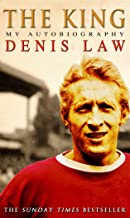 Striker: Denis Law – The King: My Autobiography/Denis Law: My Life in Football – Joint top goalscorer in Scotland’s history, Denis Law’s tally of 30 is made all the more impressive having scored them in some 55 games for his country. Missing out on the 1958 World Cup, Law would feature in only the 1974 World Cup but was still named Scotland’s Golden Player – the most outstanding player of the past 50 years – by the Scottish Football Association. He won the Ballon d’Or in 1964 and was included in the PFA Team of the Century. His most recent autobiography was released in 2011.
Striker: Denis Law – The King: My Autobiography/Denis Law: My Life in Football – Joint top goalscorer in Scotland’s history, Denis Law’s tally of 30 is made all the more impressive having scored them in some 55 games for his country. Missing out on the 1958 World Cup, Law would feature in only the 1974 World Cup but was still named Scotland’s Golden Player – the most outstanding player of the past 50 years – by the Scottish Football Association. He won the Ballon d’Or in 1964 and was included in the PFA Team of the Century. His most recent autobiography was released in 2011.
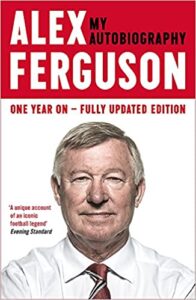 Manager: Alex Ferguson – Managing My Life/My Autobiography/Leading – With no autobiography available by the legendary Scottish manager Jock Stein, despite only a brief spell in charge of the national team, Sir Alex Ferguson is chosen as manager after his incredible success on the domestic front. With an unparalleled haul of team and individual awards, Ferguson stands head and shoulders above most other managers, Scottish or otherwise, in his achievements and legacy. His most recent book, Leading, published in 2015, gives an insight into his managerial philosophy.
Manager: Alex Ferguson – Managing My Life/My Autobiography/Leading – With no autobiography available by the legendary Scottish manager Jock Stein, despite only a brief spell in charge of the national team, Sir Alex Ferguson is chosen as manager after his incredible success on the domestic front. With an unparalleled haul of team and individual awards, Ferguson stands head and shoulders above most other managers, Scottish or otherwise, in his achievements and legacy. His most recent book, Leading, published in 2015, gives an insight into his managerial philosophy.
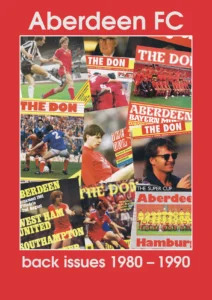 The match programme. Once the only source of information about your club and a must-have for spectators at the game. Now however, with the advent of social media and its ability to provide up to date information at the push of a button, and the recent change by some clubs to a digital programme, the very existence and purpose of the ‘physical’ version is under threat. Collectors though will be please with the recent release of Aberdeen FC: Back Issues 1980-1990 which as the books introduction states, is “the definite guide to Aberdeen FC match programmes issued during the 1980s, the decade which defined the modern club” with, “the aim of producing…a series of similar guides covering each decade”.
The match programme. Once the only source of information about your club and a must-have for spectators at the game. Now however, with the advent of social media and its ability to provide up to date information at the push of a button, and the recent change by some clubs to a digital programme, the very existence and purpose of the ‘physical’ version is under threat. Collectors though will be please with the recent release of Aberdeen FC: Back Issues 1980-1990 which as the books introduction states, is “the definite guide to Aberdeen FC match programmes issued during the 1980s, the decade which defined the modern club” with, “the aim of producing…a series of similar guides covering each decade”. GK: Peter Shilton – The Autobiography/Saved – England’s record appearance maker, Peter Shilton won some 125 caps across a career spanning two decades. He represented England at five major tournaments, including Euro 1980 and 1988 and the 1982, 1986 and 1990 World Cup, and shares the record for most World Cup clean sheets (10) with Fabien Barthez. Peter Shilton’s domestic career took in some 11 teams, including Leicester City, Stoke City and Notts Forest. His forthcoming second autobiography, Saved, to be published in September, will reflect on his struggle with gambling.
GK: Peter Shilton – The Autobiography/Saved – England’s record appearance maker, Peter Shilton won some 125 caps across a career spanning two decades. He represented England at five major tournaments, including Euro 1980 and 1988 and the 1982, 1986 and 1990 World Cup, and shares the record for most World Cup clean sheets (10) with Fabien Barthez. Peter Shilton’s domestic career took in some 11 teams, including Leicester City, Stoke City and Notts Forest. His forthcoming second autobiography, Saved, to be published in September, will reflect on his struggle with gambling. Def: Rio Ferdinand – Rio: My Story/Rio: My Decade as a Red/#2Sides – My Autobiography/Thinking Out Loud – With no autobiography by arguably England’s best ever defender, Bobby Moore, Rio Ferdinand steps in as England’s second-most capped central defender (behind Bobby Moore), with some 81 caps and 3 goals. Featuring for England from 1997 through to 2011, Ferdinand was included in three World Cup squads, as well as Euro 2008. Domestically, he won the Premier League, League Cup, Community Shield, Champions League and Club World Cup. His most recent book was published in 2017.
Def: Rio Ferdinand – Rio: My Story/Rio: My Decade as a Red/#2Sides – My Autobiography/Thinking Out Loud – With no autobiography by arguably England’s best ever defender, Bobby Moore, Rio Ferdinand steps in as England’s second-most capped central defender (behind Bobby Moore), with some 81 caps and 3 goals. Featuring for England from 1997 through to 2011, Ferdinand was included in three World Cup squads, as well as Euro 2008. Domestically, he won the Premier League, League Cup, Community Shield, Champions League and Club World Cup. His most recent book was published in 2017. MF: Bobby Charlton – My Manchester United Years/My England Years/My Life in Football/1966: My World Cup Story – One of England’s 1966 heroes, Bobby Charlton won the Ballon d’Or in the same year and was also named FWA Footballer of the Year. He sits seventh on the list of appearances for England, with 106, and second on the list of top goal-scorers, having notched 49 in his career. A noted member of the Busby Babes, Charlton made over 600 appearances for Manchester United and had a career spanning nearly 25 years. Charlton’s clutch of autobiographies cover his impressive career, with the latest charting that epic World Cup triumph.
MF: Bobby Charlton – My Manchester United Years/My England Years/My Life in Football/1966: My World Cup Story – One of England’s 1966 heroes, Bobby Charlton won the Ballon d’Or in the same year and was also named FWA Footballer of the Year. He sits seventh on the list of appearances for England, with 106, and second on the list of top goal-scorers, having notched 49 in his career. A noted member of the Busby Babes, Charlton made over 600 appearances for Manchester United and had a career spanning nearly 25 years. Charlton’s clutch of autobiographies cover his impressive career, with the latest charting that epic World Cup triumph. MF: Kevin Keegan – My Autobiography/My Life in Football – The only English footballer to have won the Ballon d’Or twice, Kevin Keegan captained England at Italy 1980. However, with England missing out on both the 1974 and 1978 World Cups, Keegan featured only in Spain 1982, but briefly due to injury. Across his career, Keegan won 63 caps and scored 21 goals, whilst domestic success came most notably at Liverpool. Following management spells with Newcastle and Fulham, Keegan stepped into the England role for one year. His second autobiography was published in 2018.
MF: Kevin Keegan – My Autobiography/My Life in Football – The only English footballer to have won the Ballon d’Or twice, Kevin Keegan captained England at Italy 1980. However, with England missing out on both the 1974 and 1978 World Cups, Keegan featured only in Spain 1982, but briefly due to injury. Across his career, Keegan won 63 caps and scored 21 goals, whilst domestic success came most notably at Liverpool. Following management spells with Newcastle and Fulham, Keegan stepped into the England role for one year. His second autobiography was published in 2018. Striker: Wayne Rooney – The Way It Is/My Decade in the Premier League – Wayne Rooney holds the record as both England’s youngest ever goalscorer and the Three Lions’ top scorer, having bagged 53 goals in 120 appearances – whilst sitting second in the most caps chart. His England career spanned some 15 years, including appearances at Euro 2004, 2012 and 2016, and World Cup 2006, 2010 and 2014. Domestically, he holds the record as Manchester United’s top goalscorer, with 253 goals to his name, and is one of only two English players to have won the Premier League, FA Cup, Champions League, League Cup, Europa League and Club World Cup. His second autobiography was published in 2012.
Striker: Wayne Rooney – The Way It Is/My Decade in the Premier League – Wayne Rooney holds the record as both England’s youngest ever goalscorer and the Three Lions’ top scorer, having bagged 53 goals in 120 appearances – whilst sitting second in the most caps chart. His England career spanned some 15 years, including appearances at Euro 2004, 2012 and 2016, and World Cup 2006, 2010 and 2014. Domestically, he holds the record as Manchester United’s top goalscorer, with 253 goals to his name, and is one of only two English players to have won the Premier League, FA Cup, Champions League, League Cup, Europa League and Club World Cup. His second autobiography was published in 2012. Manager: Bobby Robson – An Autobiography/Bobby Robson: An Englishman Abroad/Farewell but not Goodbye/My Kind of Toon – Whilst it was Alf Ramsey who led England to World Cup success, it was Bobby Robson who oversaw their best post-World Cup campaign, prior to Gareth Southgate’s arrival, leading the Three Lions to the semi-finals of Italia 90. He was at the helm for eight years, winning some 47 of his 95 games in charge, and led England at Mexico 1986 and Euro 1988. As a player, he represented England 20 times, scoring 4 goals, and had a successful managerial career at Ipswich, Barcelona and notably his hometown of Newcastle. As well as a number of autobiographies, Harry De Cosemo’s Black and White Knight was published earlier this year.
Manager: Bobby Robson – An Autobiography/Bobby Robson: An Englishman Abroad/Farewell but not Goodbye/My Kind of Toon – Whilst it was Alf Ramsey who led England to World Cup success, it was Bobby Robson who oversaw their best post-World Cup campaign, prior to Gareth Southgate’s arrival, leading the Three Lions to the semi-finals of Italia 90. He was at the helm for eight years, winning some 47 of his 95 games in charge, and led England at Mexico 1986 and Euro 1988. As a player, he represented England 20 times, scoring 4 goals, and had a successful managerial career at Ipswich, Barcelona and notably his hometown of Newcastle. As well as a number of autobiographies, Harry De Cosemo’s Black and White Knight was published earlier this year. GK: Jim Leighton – In the Firing Line – With 91 caps to his name, Jim Leighton is the most capped Scottish goalkeeper, whilst sitting behind only Kenny Dalglish overall. His Scotland career spanned some 16 years from 1982 to 1998, which included two World Cups in 1986 and 1990. Whilst he missed out on Euro 92 and Euro 96, he returned as number one in the World Cup 1998 qualification and became the oldest player to play for Scotland aged 40 years and 78 days before David Weir surpassed this. His autobiography was published in 2000.
GK: Jim Leighton – In the Firing Line – With 91 caps to his name, Jim Leighton is the most capped Scottish goalkeeper, whilst sitting behind only Kenny Dalglish overall. His Scotland career spanned some 16 years from 1982 to 1998, which included two World Cups in 1986 and 1990. Whilst he missed out on Euro 92 and Euro 96, he returned as number one in the World Cup 1998 qualification and became the oldest player to play for Scotland aged 40 years and 78 days before David Weir surpassed this. His autobiography was published in 2000. Def: Willie Miller – The Miller’s Tale/The Don/Willie Miller’s Aberdeen Dream Team – Described by Sir Alex Ferguson as ‘the best penalty box defender in the world’, Willie Miller featured for Scotland from 1975 to 1989, amassing 65 caps and one goal. He competed at the 1986 World Cup, but injury meant he missed out in 1990 and ultimately had to retire. Miller’s domestic career was spent entirely at Aberdeen (with a brief loan spell at Peterhead), where he notched up a club record 560 appearances, as well as 21 goals, in a 19-year career. He has three books to his name.
Def: Willie Miller – The Miller’s Tale/The Don/Willie Miller’s Aberdeen Dream Team – Described by Sir Alex Ferguson as ‘the best penalty box defender in the world’, Willie Miller featured for Scotland from 1975 to 1989, amassing 65 caps and one goal. He competed at the 1986 World Cup, but injury meant he missed out in 1990 and ultimately had to retire. Miller’s domestic career was spent entirely at Aberdeen (with a brief loan spell at Peterhead), where he notched up a club record 560 appearances, as well as 21 goals, in a 19-year career. He has three books to his name. MF: Graeme Souness – No Half Measures/Graeme Souness: A Manager’s Diary/Souness: The Management Years/Graeme Souness – Football: My Life, My Passion – Across 12 years, Graeme Souness made 54 appearances for the Tartan Army, scoring four goals. In his time, he featured at three World Cups, including Argentina 1978, Spain 1982 and Mexico 1986. At club level, he made his name captaining a Liverpool side that dominated in the late 1970s/early 1980s before moving on to Sampdoria and later Rangers. A twenty-year managerial career ended at Newcastle in 2006 before Souness made the move into the media. His most recent autobiography was published in 2017.
MF: Graeme Souness – No Half Measures/Graeme Souness: A Manager’s Diary/Souness: The Management Years/Graeme Souness – Football: My Life, My Passion – Across 12 years, Graeme Souness made 54 appearances for the Tartan Army, scoring four goals. In his time, he featured at three World Cups, including Argentina 1978, Spain 1982 and Mexico 1986. At club level, he made his name captaining a Liverpool side that dominated in the late 1970s/early 1980s before moving on to Sampdoria and later Rangers. A twenty-year managerial career ended at Newcastle in 2006 before Souness made the move into the media. His most recent autobiography was published in 2017. MF: Kenny Dalglish – My Autobiography/My Liverpool Home/Kenny Dalglish: Notes on a Season – As well as a legend of Celtic and Liverpool, Kenny Dalglish wrote his name into the Scottish history books, by being the most capped Scottish player, with 102 caps, and matching Denis Law as Scotland’s top goalscorer. During his career, he won the PFA Player’s Player of the Year and FWA Footballer of the Year twice, whilst being runner-up to Michel Platini for the Ballon d’Or in 1983. He was inducted to both the English and Scottish Football Halls of Fame. As well as two autobiographies, Dalglish’s Notes on a Season compiles his programmes notes from the 1989/90 season as Liverpool manager.
MF: Kenny Dalglish – My Autobiography/My Liverpool Home/Kenny Dalglish: Notes on a Season – As well as a legend of Celtic and Liverpool, Kenny Dalglish wrote his name into the Scottish history books, by being the most capped Scottish player, with 102 caps, and matching Denis Law as Scotland’s top goalscorer. During his career, he won the PFA Player’s Player of the Year and FWA Footballer of the Year twice, whilst being runner-up to Michel Platini for the Ballon d’Or in 1983. He was inducted to both the English and Scottish Football Halls of Fame. As well as two autobiographies, Dalglish’s Notes on a Season compiles his programmes notes from the 1989/90 season as Liverpool manager. Striker: Denis Law – The King: My Autobiography/Denis Law: My Life in Football – Joint top goalscorer in Scotland’s history, Denis Law’s tally of 30 is made all the more impressive having scored them in some 55 games for his country. Missing out on the 1958 World Cup, Law would feature in only the 1974 World Cup but was still named Scotland’s Golden Player – the most outstanding player of the past 50 years – by the Scottish Football Association. He won the Ballon d’Or in 1964 and was included in the PFA Team of the Century. His most recent autobiography was released in 2011.
Striker: Denis Law – The King: My Autobiography/Denis Law: My Life in Football – Joint top goalscorer in Scotland’s history, Denis Law’s tally of 30 is made all the more impressive having scored them in some 55 games for his country. Missing out on the 1958 World Cup, Law would feature in only the 1974 World Cup but was still named Scotland’s Golden Player – the most outstanding player of the past 50 years – by the Scottish Football Association. He won the Ballon d’Or in 1964 and was included in the PFA Team of the Century. His most recent autobiography was released in 2011. Manager: Alex Ferguson – Managing My Life/My Autobiography/Leading – With no autobiography available by the legendary Scottish manager Jock Stein, despite only a brief spell in charge of the national team, Sir Alex Ferguson is chosen as manager after his incredible success on the domestic front. With an unparalleled haul of team and individual awards, Ferguson stands head and shoulders above most other managers, Scottish or otherwise, in his achievements and legacy. His most recent book, Leading, published in 2015, gives an insight into his managerial philosophy.
Manager: Alex Ferguson – Managing My Life/My Autobiography/Leading – With no autobiography available by the legendary Scottish manager Jock Stein, despite only a brief spell in charge of the national team, Sir Alex Ferguson is chosen as manager after his incredible success on the domestic front. With an unparalleled haul of team and individual awards, Ferguson stands head and shoulders above most other managers, Scottish or otherwise, in his achievements and legacy. His most recent book, Leading, published in 2015, gives an insight into his managerial philosophy. This site was lucky enough to
This site was lucky enough to  8)
8) 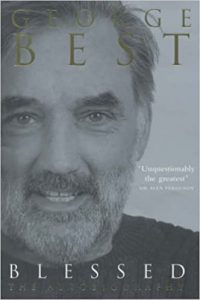 4)
4) 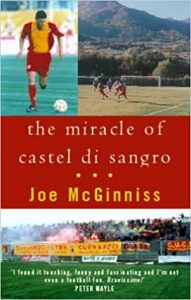 2)
2) 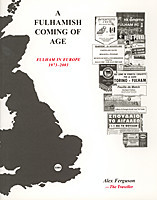 Alex Ferguson started watching Fulham in the 1950s and did so through the many ‘ups and downs’ the club endured, until his untimely death in 2006. Alex became one of the most recognised, if not the most renowned fan of the club, following the ‘Lilywhites’ wherever and whoever they played. No matter if it was the first-team, the reserves, the youth team, Fulham Ladies – league, cup, testimonial, friendly; Alex was there. He also watched England at all levels with the same enthusiasm and fanaticism and his journeys with both club and country earned him the moniker of ‘The Traveller’.
Alex Ferguson started watching Fulham in the 1950s and did so through the many ‘ups and downs’ the club endured, until his untimely death in 2006. Alex became one of the most recognised, if not the most renowned fan of the club, following the ‘Lilywhites’ wherever and whoever they played. No matter if it was the first-team, the reserves, the youth team, Fulham Ladies – league, cup, testimonial, friendly; Alex was there. He also watched England at all levels with the same enthusiasm and fanaticism and his journeys with both club and country earned him the moniker of ‘The Traveller’.